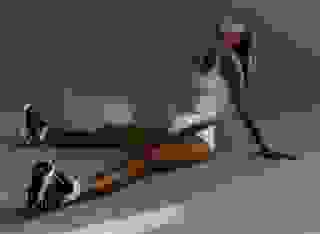Note: You can change font size, font face, and turn on dark mode by clicking the "A" icon tab in the Story Info Box.
You can temporarily switch back to a Classic Literotica® experience during our ongoing public Beta testing. Please consider leaving feedback on issues you experience or suggest improvements.
Click hereStill, he might as well play: His body seemed to take on a life of his own, and his hand was reaching out for the money almost before he realized he was doing it. A hundred dollars; more than he'd had at one time in his entire life. More money, maybe, than he'd had in his entire life put together. Money to live like a king...
But he snatched his hand back at the last moment. Looking the older man in his rounded spectacles, he nodded. "All right then: the secret. Show me, if it's so great as all that."
Griffin put the cash away. Then he put out all of the lamps except one, and turned that one so low that Griffin himself almost vanished in the gloom. His every hair standing up, the boy watched what was happening as best he could in the dark. Taking the big brass key to the painted mermaid's cabinet again, Griffin unlocked another door, a secret one at the false back of the display; the door swung open under its own weight, ferrying the grimacing little taxidermied monkeys out of sight. Behind them, so large that it almost didn't fit at all, was something...else.
At first the boy thought she was alive: Her face, her eyes, her dappled skin, the way her curly hair hung about her perfectly rounded shoulders, all of it was the picture of vitality. Especially those eyes, the great, glittering, yellow depths of them, eyes from another world, eyes that had seen shadowy eons beneath the crushing black waves of such distant seas that the waters from them had still never reached these shores.
The boy imagined there was a smell in the air now, like salt and wind, a sea smell, the smell of a wharf or a boardwalk or an old tall ship, a smell that made him nostalgic for things that had never happened to him. The dark skin of the woman in the cabinet was tinged blue, and webbing connected her thin and supple fingers.
But of course it was below the waist that she was strangest of all, her long, snaking, fishy tail coiled up beneath and behind her, wrapped so many times that the boy couldn't count the loops. She'd never have fit otherwise, but even as constrained as she was, he could still see the delicacy of each fin, and the sapphire gleam of each blue scale.
He had thought at first that she was alive, but quickly the boy realized that was impossible. She must be another taxidermied thing, another creation of the mysterious crafters of humbugs and scams. And yet...
"There's something about her, isn't there?" Griffin said, finishing the boy's own thoughts. In reply, the boy merely exhaled, realizing that he'd been holding his breath for some time. "You can imagine exactly what she would have looked like, in that age before the lands rose above the sea--an Atlantean place that time forgot, where the fish would surely all be giant monsters, like at the beginning of time. She's our ambassador from that age--the last one, perhaps. Maybe the only one we've ever had."
The boy stood rooted in his shoes, and he raised a hand, as if to touch her—but that would be profane, he quickly realized, and stopped almost as soon as he'd started. His heart swelled up in his chest so large that he could hardly speak, and when he did the only thing he could think to say was: "She's...real. I mean, isn't she?"
"Of course she is. 'Sirenus Oceanus,' I call her—that's the proper scientific name."
"But she can't be. You must have made her."
"Must I?" Griffin said, his voice a bland whirr. "No, not this one: She looked exactly like this the first time I ever saw her. And I felt exactly what you're feeling now: Knowing not only that she was real, but that she knows us too. She's not alive--but she's not exactly dead either. There's something in her, not a soul or a spirit, but something that's never entirely left her body, and maybe never will. I wonder if she can even see us..." But the old man stopped, as if realizing for the first time what he was saying.
The boy wanted to get closer, but the worn soles of his shoes scraped only a few inches on the dirt floor. It was like meeting an animal in the wild—captivating, but at the same time your wits told you that you had to be ready to flee if need be. It was a primitive impulse, one that came from the sea itself. He thought perhaps the woman (not a woman, he corrected himself, in spite of how she looked) leaned forward too--but that was impossible.
But she WAS looking at him, the boy was sure. He didn't know how or why, but he knew. "She likes you," Griffin said after a time.
"Where'd she come from? You said she'd been like this ever since you got her--but where was that? How was that?"
"That's the gimmick, boy: You'll never know," Griffin said, and all at once he shut the cabinet again. Gently but firmly, Griffin turned the boy around and led him to the door. "That's enough for now; few people ever see this—only a handful each year, and sometimes none at all. The marks, they're content with the humbug; only a special few ever see the real thing."
"How...how is it possible?"
"Ours is not to question how. Such things are mysteries—a mystery of the deep in this case. Quite an adventure for one night, yes?" The lamp on the desk was burning low—it needed refueling.
"I'll say," said the boy. Then: "Why did you show me that?"
"You wanted to see."
"Lots of people would want to see. Why me?"
Instead of answering right away, Griffin took him outside. It was still night—only a few minutes had passed, but it felt like almost forever. The boy waited for an answer, but instead Griffin took him for a walk. He realized they were leaving the campground, and once again he started to worry--sometimes the carnival folk got tired of robbing you with cons and just decided to do it the old-fashioned way, he knew, if you were dumb enough to be caught alone with them. It wouldn't make any sense for the old man to rob him now, but he felt anxious all the same.
But they reached the shoulder of the road without incident, and it was only then that Griffin spoke again. "When I offered you the money, you thought I was scamming you; you must have, because you've got a brain. But you went along anyway Why? Because I tricked you? No. What then?"
The boy spent a long time answering—not because he didn't know the answer, but because he was startled to realize how obvious it was. "I guess...I must have wanted to be scammed. Just like the people who come into your tent to see the fakes; that's why they're not mad. People like being conned; it doesn't make any sense, but it must be true. And you don't show most people the real mermaid because...most of them would rather see what's fake instead. Wouldn't they?"
Griffin took the boy's hand. He thought at first it was just a handshake, but then he felt something in his palm: the $100 bill.
"Come back tomorrow night," Griffin said. "After closing we'll talk more."
Amazed, the boy said nothing. Only when Griffin had already walked away did he call after:
"I'll be here! I'll come back, whatever you say." Then: "Will you show her to me again?"
But the dark didn't give any answers.
***
The boy did come back the next night, and the night after, and every night he could, always waiting until after the carnival closed and drove out the last of the townies. Slipping into Griffin's tent, he found the older man waiting for him.
As Griffin directed, the boy did work around the collection—dusting, polishing, sanding, sweeping. Within two weeks, he was almost as familiar with the assembled objects as Griffin was. While he worked, Griffin talked: about the carnival, about the past, about the days when shows like this specialized in live acts—freaks, geeks, and human oddities—until most places outlawed such things.
He explained every trick on the midway, every act in every tent and stall and how each of them worked, as well as how to pick marks and how to pick pockets with a smile and a slap on the back. Every good carnival, Griffin said, was a scam at heart; "More and more carnivals are trying to go honest these days, but they're falling on their own swords. An honest carnival is like a lion without teeth, a bird without wings, a fish--"
"A fish on land?" the boy said, from on top of a ladder, where he was gluing new feathers onto what were labeled as the wings of Pegasus. From below, Griffin laughed.
"That's right!" The power of a carnival, he explained, was that everything was a lie. For a carnival to thrive, the truth couldn't be allowed to get a breath of air. "Did you know that in other countries a carnival is a religious festival?" Griffin said.
"No," said the boy.
"It's true," Griffin said. "Carnival is the season of excess before Lent. When the churches realized they couldn't rid us of our pagan ways, they invited us to have five days of merriment before the lean times. But not so in this country, except in Louisiana—you've never been to Louisiana?"
"I've never been anywhere."
"Down there they have it special, but not most other places. That's why instead we have carnivals all the time—traveling amusements, carnivals that never end but just move on, move away, down south in the cold winter months, up north during the hot summertimes. Which is it now?"
"It's summer."
"Of course. But it's always carnival somewhere in America. Do you know what the word means? From the Latin, carne vale—'a farewell to the flesh.' Figure out what that means and you'll know everything there is about this business. Every con, every trick, every rigged game and kootchie girl's wink, that's all it is: a farewell to the flesh."
"Yes sir," the boy said. He didn't really understand, but he had the feeling that was just as well--better, maybe.
The boy cleaned, polished, swept, sanded, hauled, tied ropes and mended tent flaps, and most of all he listened . Sometimes the talk was about Griffin's life before the carnival, his time studying medicine before he dropped out, his time in the war, his time traveling, meeting Cooger, all of it.
Rarely did he talk about what the boy wanted to hear most, which was the woman in the cabinet. Not where she'd come from or how he'd come to have her, and certainly not how she was made--for whenever he wasn't standing in front of her, the boy imagined she MUST be a fake, in spite of what Griffin said.
But how? You couldn't make taxidermy of a human the way you could an animal, not without everyone seeing the seams--nor could you embalm a body so perfectly that it would stay unspoiled for all this time in the hot summer air. (These things the boy knew because he'd pressed questions on the town undertaker, who had looked quite uncomfortable with his queries but gave his answers all the same.) But nothing artificial could look the way she did--it was, as the old man said, a mystery.
Other times--mostly the times Griffin unlocked the cabinet and let him look her in the eye--he was content to believe the old man's story and that she was really real after all, and even that she was aware of everything around her, if not exactly alive. He imagined she could see him each time--that she was happy he was there, even. Was it possible? No--but it WAS undeniable.
She was a goddess, the boy knew; not one that anyone had ever named or prayed to or built a shrine for, but a goddess all the same, and he'd be her priest if she allowed it. When she swam in lazy circles of the sea those hundreds of thousands of years ago, or when her eyes, which glittered like flecks of gold in the sand of an undersea beach, had fallen on the treasures in those long black underwater shadows, she could never have imagined this is where she'd end up.
"Is she in the cabinet or in the sea?" he asked one night, not really sure what he meant.
"This is a sea," Griffin said. "Inside are all the secrets of every ocean, a world greater and more beautiful than we'll ever see. It's her kingdom—when she lets us see her, that's her royal visits."
And when the boy looked into her eyes, he thought that was true too: Those eyes had seen things he couldn't imagine. If only she could talk to him, he thought...but maybe she could? Maybe it was just her prerogative not to.
***
The season began to turn, and the carnival crowds grew thinner. Most of them had spent everything they intended to, and they began to cast dark looks in the direction of the fairground. Still, the boy came every night that he could, and the times that he couldn't—when his father somehow failed to pass out at an early hour—he didn't sleep, but instead lay awake and thought about her.
In his mind—was it a dream? He couldn't say, although he always felt that it happened during waking—they were together, finally, and she no longer had a tail but instead beautiful long legs and a woman's body, streaming with water. "Isaac," she told him, reaching out to twine her long arms around him and draw in close. "Love me. Love me."
Her coral lips met his, and in that kiss there was desire that the boy had never known. She wanted to see, Griffin had said, but no, that wasn't it; she wanted to EXPERIENCE, the land, the people, the world, all of it. The boy was from the land, and so, in his way, he was what she wanted.
He was naked, and their bodies wrapped around each other. Daring to touch her, the boy's hands wandered over the glistening perfection of her bare skin; he'd imagined she would feel like marble, like a statue of the goddess that she was, but instead she was soft, smooth, and somehow cool. The first kiss was like a warm, deep sigh, the second was like electricity, and the third was like a feeling of falling and never coming up again.
They drifted together in an endless sea, the waters cool but their bodies hot. Her mouth and lips warm and alive, and he grabbed handfuls of long, streaming hair and pushed his lips down her body. The waters around them turned deep blue.
The woman kissed the boy's body with a million tiny caresses of her mouth, both of them writhing together in the abyss. He reached around to cup her rear in both hands as her legs spread wide open and encircled him. He sucked on the dark points of her alert nipples, and she pushed him harder into herself, so that their bodies could join and never separate.
They were every part of each other, touching, stroking, squeezing, caressing, until the woman trembled and shook, overflowing with gasps, thrashing her head from side to side, fingers clawing at bare backs and mouths meeting, melting into kisses, then retreating only to catch one another again, cool skin warming and then heating and then turning white hot.
Panting and giddy, the boy let her close her legs harder around his body and splay her hands across him, the pads of her fingers teasing the sinews of his chest as she lowered herself down and slipped him inside. She clenched around the smooth, hard sensation of his upright cock right away, and the pair of them clung to each other as she started to ride him, her thighs flexing up as she kissed him as hard and deep and long as she could, her wet hair surrounding them both.
For the first time he wondered how it was he wasn't drowning under the waves. Then he realized that he was, but it was okay—he was drowned in the moment, the sensations, the need, the longing. She was overwhelming him, pulling him down, dragging him under, but it's where he wanted to be, where he needed to be. Just as much as she waned to see the world, he was desirous of this place in the ocean, the hidden paradise of her body, her kiss, her love, her everything.
But he did struggle now to keep up, even as she kept going faster and faster and they sank deeper together. The waters turned dark now, black almost, and they seemed to be closing in all around, and the boy felt a flutter of panic even as the first shocking spike of orgasm hit him and he felt himself open up and release. Everything was going black now, everything drawing in around them, until--
He woke (or snapped to, if he had been awake already) with a start, and sat up in his bed until the beating of his heart finally slowed. When the cold night air drifted through the drafty house, it chilled his naked flesh. Both the boy and his bed were damp—almost soaking wet in fact.
Must have been sweating, he thought. But when he remembered the feeling of the woman in his arms and the refreshing coolness of the water as she pulled him down and then felt those cloying wet spots again, he couldn't help but shiver. They didn't look or smell like sweat; they smelled of seawater, and the scent clung to him all the next day.
That night, in the old dark tent, Griffin looked over his ledger book again. After he crossed every T and dotted every I and counted every nickel, there wasn't much to show for it. Closing his book, Griffin sighed and said, "Well, summer can't last forever, can it?"
The boy, who was sweeping, looked up and said, "Sir?"
"In a day or two, I imagine, we'll be on our way--the carnival, that is. Meaning I have a lot of work to do to make this attraction road-ready once more."
The boy's heart sank, but he worked hard not to show it, only to nod and attempt what he thought of as a stoic look. "Summer can't last forever."
Leaning back in his chair, Griffin looked at the boy as if seeing him for the first time. "And you?"
Still clutching the broom, the boy said, "I guess I need to start thinking about...I don't know what. Whatever I'm going to do with myself."
"No great plans, then? School? Work? The army, perhaps?"
"Maybe," the boy said, without much enthusiasm. He felt tears ready to fall, but he fought them back; it wouldn't be right to cry here in the tent, he felt somehow. It would have been a kind of sin.
Griffin appeared to consider this, and then almost casually he said, "What about travel? Am I wrong to imagine you have some appetite to see America? Every state in the union?"
The small hairs on the boy's arms stood up. "Sure, someday--if I ever have the money for that kind of thing. If I ever have any money at all."
"Mm. Well there's no sense playing games about it: I'm not as young as I used to be, and there's work to be done on this attraction that I'm not suited for anymore. You already know the job and the carnival, and--well I'm not going to say that it's an easy life, you know, town to town, year in and year out, working the marks all the time. But it's not without its rewards: It's a higher calling, in its way--the one true American religion, and we her apostles, the devil help us all. In any case what do you say? Don't pretend you haven't been thinking about it."
The boy's hands tightened on the broomstick. "Yes," he said finally. "Yes sir."
Griffin looked him up and down, just the way he had the first night they met. "That's good then," he said. "Do you have any business you need to take care of? Family or that?"
Shaking his head, the boy said, "Nobody but my father, and that's better off without goodbyes."
"Put that thing down before you give yourself splinters and go take the rest of the night off," Griffin said, taking the broom. "When you get home, pack as many things as will fit in a sack, and make sure it's light when you're finished.
"And then...think. Really think about what it is you're doing. When tomorrow comes, if you still want to, come back here and we'll take care of the particulars."
The boy knew that he didn't have to think about it--or more precisely that he'd thought about it every night for long enough that he knew very well all his thinking was already done. But even so he followed Griffin's instructions; packing didn't take long--the sack wasn't even half full when he finished, and yet it contained nearly everything he owned.
Rather than sleep to the sound of his father's drunken snores (the older man wouldn't be awake again until well after noon the next day), the boy climbed up onto his roof and watched as the night slowly faded into a rose-yellow dawn that glistered like gold on the tin roofs of every shack in the neighborhood. That color made him think of another thing that Griffin had told him: that money, and the act of it trading hands, was also a sacred thing--maybe THE most sacred thing. At every temple ever built, people had given coins in exchange for--for what? For humbug, Griffin would say, for hokum. Every church was a carnival at heart, a place of willing cons.








